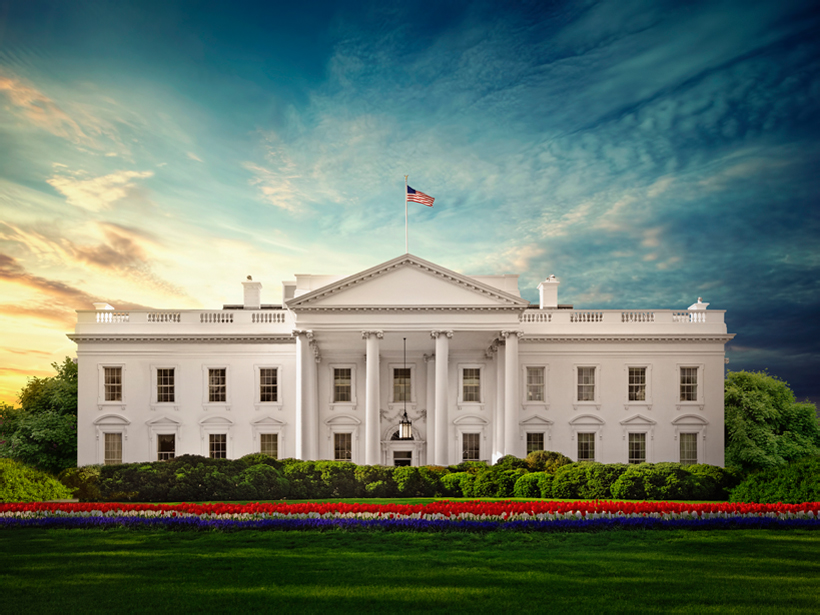The White House on 22 October revived the President’s Council of Advisors on Science and Technology (PCAST) and announced that the seven initial members aside from the chairman include six industry representatives and one university professor.
Kelvin Droegemeier, director of the White House Office of Science and Technology Policy (OSTP), will serve as chair. Nine other PCAST appointees, including several additional members of academia, will be announced once they complete a clearance process, according to the White House.
“The PCAST shall advise the President on matters involving science, technology, education, and innovation policy,” a White House executive order stated. “The Council shall also provide the President with scientific and technical information that is needed to inform public policy relating to the American economy, the American worker, national and homeland security, and other topics.”
With the new advisory council, “we can leverage the full innovation ecosystem, solve some of the Nation’s greatest challenges, and ensure America’s science and technology leadership for generations to come.”
The executive order does not mention energy, the environment, or public health, topics that were specifically included in a PCAST executive order issued by former president Barack Obama in April 2010. That earlier order noted that the advice from the PCAST “shall include, but not be limited to, policy that affects science, technology, and innovation, as well as scientific and technical information that is needed to inform public policy relating to the economy, energy, environment, public health, national and homeland security, and other topics.”
“Under this [the Trump] administration, science and technology in America continues to advance by leaps and bounds,” according to a statement from Droegemeier. “PCAST will be critical to our continued efforts, with each member bringing a unique expert perspective to the table. By convening a diverse group of our Nation’s foremost leaders across a broad range of fields, we can leverage the full innovation ecosystem, solve some of the Nation’s greatest challenges, and ensure America’s science and technology leadership for generations to come.”
The newly announced PCAST members are Catherine Bessant, chief technology officer of Bank of America; H. Fisk Johnson, chairman and chief executive officer for S. C. Johnson & Son Inc.; Dario Gil, director of IBM Research; Sharon Hrynkow, senior vice president for medical affairs at Cyclo Therapeutics; A. N. Sreeram, vice president and chief technology officer for Dow Chemical; Shane Wall, chief technology officer and global head of HP Labs; and K. Birgitta Whaley, director of the Quantum Information and Computation Center at the University of California, Berkeley.
“Belated” Creation of Administration’s PCAST
John Holdren, who served as OSTP director under Obama, said that he welcomes “the belated creation of a Trump administration PCAST” to work with Droegemeier on important issues of national policy on science, technology, and innovation.
Historically, PCAST and its predecessor group, the President’s Science Advisory Committee, have played important roles connecting the White House with the views of top scientists, engineers, and innovators from business, universities, and civil society organizations, said Holdren, who currently holds several positions including professor of environmental policy at Harvard University’s John F. Kennedy School of Government.
The new advisory council “is working under a president whose apparent interest in inputs from scientists is minimal.”
He compared Trump’s PCAST with Obama’s, which Holdren said was announced “fully formed” on 27 April 2009, about 3 months after Obama’s first inauguration, and which completed nearly 40 studies requested by the White House.
“The new PCAST has three big handicaps by comparison: It is starting more than 2 and a half years later in the game; it is working under a president whose apparent interest in inputs from scientists is minimal; and the crucial issues at the intersection of science and technology with the immense challenge of climate change do not seem to be on its stated agenda at all,” Holdren said.
However, Holdren called Droegemeier “a strong leader.” Holdren said that the initial PCAST appointees include many distinguished individuals, but that the new council so far includes minimal representation from academia and none from civil society. “One may hope that the remaining appointments will bring more sectoral diversity and that despite the late start, the group will be able to make some significant contributions,” he said.
—Randy Showstack (@RandyShowstack), Staff Writer
Citation:
Showstack, R. (2019), Industry leaders dominate Trump’s science and tech advisory council, Eos, 100, https://doi.org/10.1029/2019EO136131. Published on 23 October 2019.
Text © 2019. AGU. CC BY-NC-ND 3.0
Except where otherwise noted, images are subject to copyright. Any reuse without express permission from the copyright owner is prohibited.

